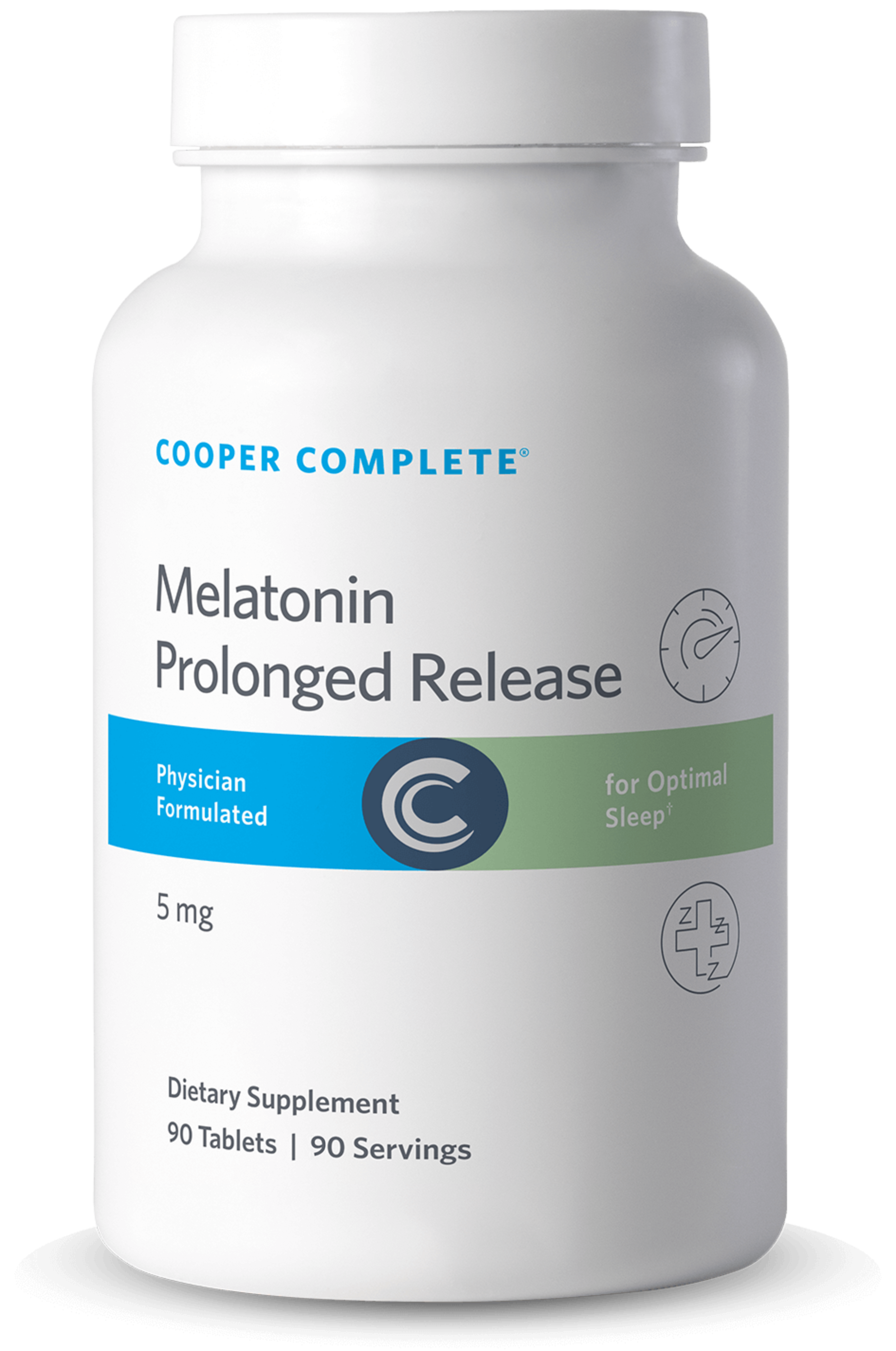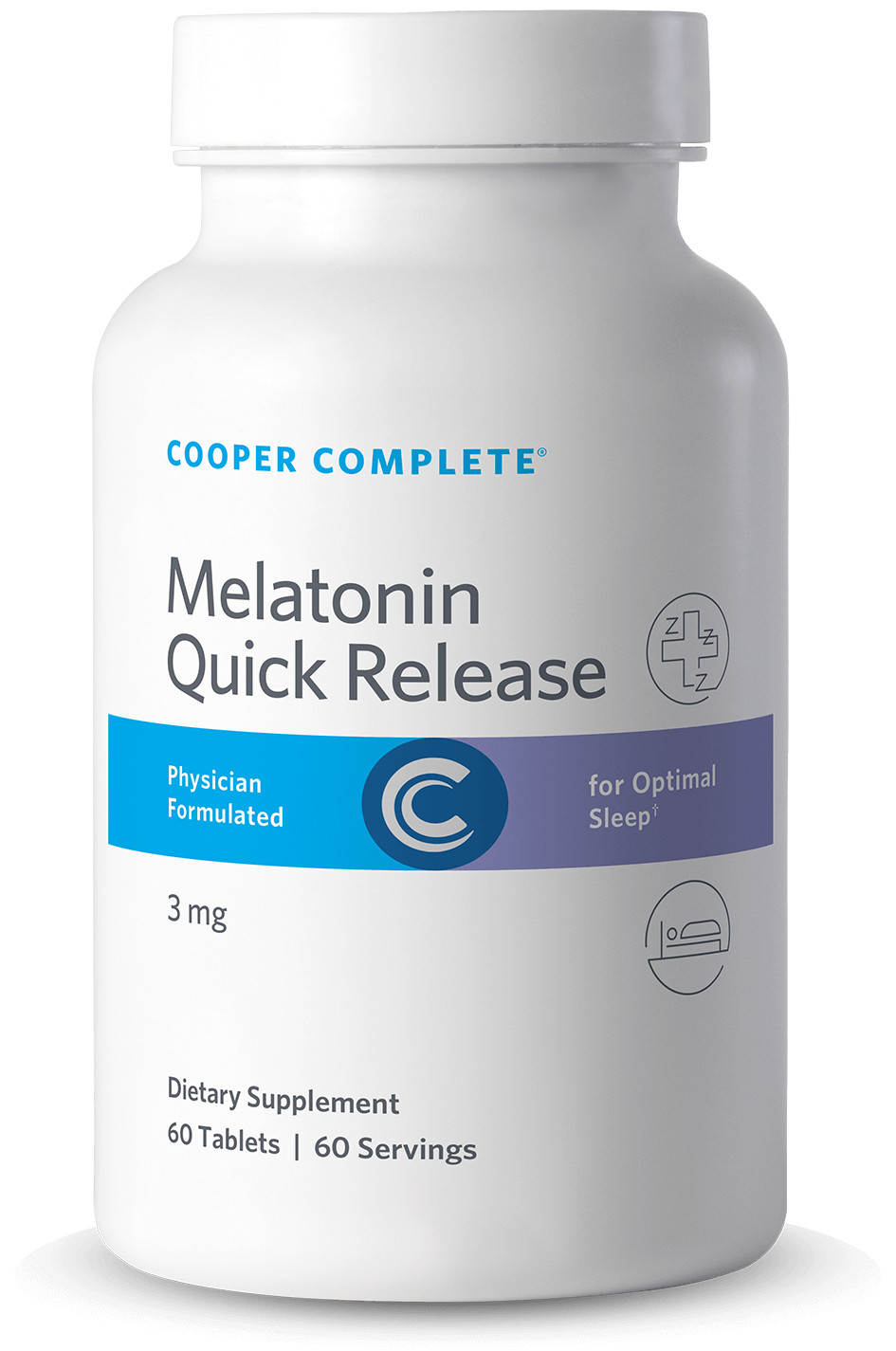Melatonin: Benefits Beyond Bedtime

Often referred to as the sleep hormone, melatonin plays a key role in regulating your body’s circadian rhythms or your sleep-wake cycles. Manufactured by the pineal gland in the brain from the amino acid tryptophan, the production of melatonin at night is tenfold higher than levels during the daytime. Melatonin is responsible for signaling the brain and the rest of your body to initiate and maintain sleep. Unfortunately, in a world where everyone is glued to their screens, science has shown prolonged screen time before bed can decrease normal melatonin production at night, causing difficulty getting to sleep.

5 mg Melatonin Prolonged Release Supplement
Prolonged Release Melatonin is a formula with a two-phased delivery system that releases melatonin quickly and then steadily over six hours. Due to supply chain constraints, this product has transitioned to a 5 mg supplement and 90 tablets per bottle.
$26.97 Add to cartAccording to the Sleep Foundation, studies of shift workers with misaligned circadian rhythms who work through the night have reported some benefit to their sleep habits from taking melatonin supplements. Melatonin has also been used to aid travelers in reestablishing their normal sleep patterns after suffering from jet lag.
Melatonin supplementation works to mimic the natural effects of melatonin secretion in the body. Specifically, Cooper Complete Quick Release Melatonin is designed to help with difficulty falling asleep, while Prolonged Release Melatonin is formulated to help you stay asleep. While melatonin is popularly used to promote quality sleep, melatonin benefits go beyond your bedtime.
Cooper Clinic Cardiologist Nina B. Radford, MD, suggests these practical tips for achieving higher quality sleep if sleep issues are a concern.
Reduce Anxiety And Stress
An important step in properly dealing with stress is getting adequate sleep. Lack of sleep can create symptoms of anxiety, stress and depression or further exacerbate preexisting symptoms. When you get a good night’s sleep, you can deal with stress more effectively.
Treat Seasonal Depression
Seasonal depression is a common condition that occurs with the change of seasons and their subsequent light changes, specifically during the fall and winter. These seasonal light changes accompany the darker months and are linked to changes in one’s melatonin production, which affects normal circadian rhythm. Due to melatonin playing a role in regulating circadian rhythm, low doses may be helpful in decreasing symptoms of seasonal depression.
Melatonin Benefits Your Eyes
Melatonin is also super-charged with antioxidants which can help prevent cell damage and maintain eye health. In fact, research suggests melatonin to potentially be beneficial in treating glaucoma and age-related macular degeneration (AMD).
In a study of 100 people with AMD who took 3 mg of melatonin for a period of 6-24 months, subjects saw a delay in age-related damage and preservation of visual clarity. A rat study also found melatonin supplementation to decrease the severity and frequency of retinopathy, which is a disease affecting the retina that can result in vision loss. Currently, research is limited and additional human studies are needed to more clearly determine the effects of long-term melatonin supplement use on eye health.

3 mg Melatonin Quick Release Supplement
Quick Release Melatonin promotes restful sleep patterns and supports falling asleep faster.† Melatonin supports normal sleep/wake cycles, healthy immune function and antioxidant activity.†
$17.98 Add to cartMelatonin Benefits To Bolster Immunity
Melatonin also serves as a potent, widespread anti-inflammatory agent. Several studies have shown melatonin to activate the immune system and reduce chronic and acute inflammation in the body. Melatonin is said to act through the immune-opioid network of cells powering the immune system, hence how it is able to enhance both innate and cellular immunity. It also can potentially enhance immune function in older individuals and patients who are immunocompromised.
Support Gut Health
Another important role melatonin plays is in gastrointestinal health and well-being. This includes regulating digestion, reducing inflammation in the digestive tract as well as relieving unpleasant symptoms of gastroesophageal reflux disease (GERD) and irritable bowel syndrome (IBS).
Several placebo-controlled trials consistently showed improvement in abdominal pain among IBS patients who took 3 mg of melatonin daily. Melatonin has also been shown to block stomach acid secretions and backflow into the esophagus, which causes heartburn, nausea and belching. It also works to decrease nitric oxide production in the body, which is responsible for relaxing your lower esophageal sphincter and allowing stomach acid to enter your esophagus.
Melatonin Benefits Beyond Bedtime
From reducing anxiety and inflammation to supporting digestive and eye health—melatonin benefits far more than just your sleep schedule.
As a reminder, your health care provider understands your health profile best, including your medical history, risks and current medication and supplement use. It is important to talk to him or her about which supplements are best for you.
